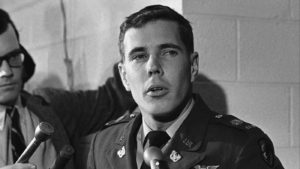Flash back 50 years ago and you find yourself recalling one of the most tumultuous years in U.S. history: 1968.
We’ll soon mark a couple of assassinations that tore the nation’s heart apart. We’ve already noted the 50 years since a one-time enemy launched an offensive against our troops in Vietnam, changing the nation’s fundamental attitude about whether the war could be won on the battlefield. At the end of this year we will mark a mission to the moon that gave us a glimmer of hope after all that heartache.
Fifty years ago today, a U.S. Army pilot — the late Hugh Thompson — landed his helicopter at My Lai, South Vietnam, and told fellow soldiers that he would kill them all if they continued to massacre innocent men, women and children. His crew chief and door gunner were standing by to carry out the order — if Thompson were to deliver it. The soldiers backed off and spared the nation from even more tragedy.
The My Lai massacre became one of the flashpoints of the Vietnam War. Army Lt. William Calley, who commanded the men who took part in the massacre, stood trial and served prison time for his role in that horrific event.
What has gone largely unremembered is the heroism that Thompson exhibited when he confronted the men who had gunned down hundreds of Vietnamese victims.
As Thompson told the Los Angeles Times before his death in 2006: “I thank God to this day that everybody did stay cool and nobody opened up. … It was time to stop it, and I figured, at that point, that was the only way the madness, or whatever you want to call it, could be stopped.”
The Army sought to hide the massacre. It sought to keep it out of public view. Then the famed journalist Seymour Hersh uncovered it and reported it worldwide.
Thompson eventually received the Soldier’s Medal for “heroism not involving actual conflict with an enemy.”
He also deserved a nation’s thanks and gratitude for stopping evil when he spotted it from on high.
